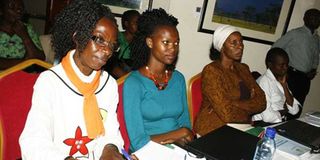Kenya doing well in closing gender inequality gap, says report

Participants at a gender mainstreaming workshop in Kisumu on September 30, 2014. The Global Gender Gap Index 2014 ranks Kenya favourably in terms of closing the gender inequality gap. PHOTO | NATION MEDIA GROUP
What you need to know:
- The Global Gender Gap Index 2014 placed Kenya at position 37 out of the 142 countries that were included in the survey.
- Kenya scored 0.7258. The highest possible score is 1 for equality while the lowest possible score is 0 for inequality.
- The gains made mainly arose from the free education policy launched by former President Mwai Kibaki and the constitutional one third gender rule.
- Globally, Kenya scores a first for opening up opportunities for all children by making primary and secondary education mandatory.
Kenya has achieved major strides in closing the gender gap on all fronts where opportunities are equally shared between men and women.
The just released Global Gender Gap Index 2014 placed Kenya at position 37 well ahead of India at 114, Brazil (71), Russia (75) and China (87), out of the 142 countries that were included in the survey.
Kenya scored 0.7258. The highest possible score is 1 for equality while the lowest possible score is 0 for inequality.
The gains made mainly arose from the free education policy launched by former President Mwai Kibaki and the constitutional one third gender rule that has increased the number of women in leadership positions across all political establishments at the national and county levels.
The same rule is slowly being applied across company boards and in public bodies amid an urgent need to ensure employment opportunities are also set at par.
EDUCATION FOR ALL
Globally, Kenya scores a first for opening up opportunities for all children by making primary and secondary education mandatory but the gains are watered down as classrooms remain congested.
Some communities are also yet to allow girls to fully access education and enough teachers are yet to be employed.
On health matters, the index places life expectancy at 54 for females and 52 for males.
This shows Kenya needs to invest heavily in healthcare so as to improve the health of its people thereby boosting production across the board, a much needed factor in the building the national economy.
ELECT WOMEN
Though it commends Kenya for making major strides politically in opening a window for women to be heard in the Senate, cabinet, the national and county assemblies, the report laments that on the elective front, much is yet to be done to help Kenyan voters to elect women on ‘substance’ basis and not on gender.
Female genital mutilation adversely affects women advancement on all fronts with early teen pregnancies blamed for mass dropouts in primary and secondary schools.
The report says that cancer, heart-related ailments as well as HIV continue to wreak havoc among families as treatment remains expensive.
Only HIV falls under a donor-funded project where drugs are provided for free while families bear all costs for treating cancer and heart-related ailments.





